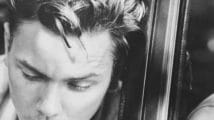Kendall Roy and Wounded Masculinity
Culture
Kendall Roy's downward spiral in 'Succession' is more than a self-destructive rich kid - in fact, as Episode 8 of season 3 shows, he makes for an unlikely everyman. *Contains spoilers*
At the end of episode 8, ‘Chiantishire’ – the penultimate episode of Season 3, in which the family have decamped to Tuscany for their estranged mother’s wedding – it appears that Kendall Roy has fallen asleep on a sun lounger on the surface of a pool. The shot from beneath, shows him, letting his beer bottle drop into the pool. Then you realise, due to the bubbles coming from his nose, that his face is at least partially submerged too. Specifically the bits that you breathe through. Cut to credits.
So is he dead? Did he kill himself? Is that Kendall leaving the series, not with a bang, but a whimper?
Well, we’ll come back to that.
Firstly – and this may seem like another aside, but it isn’t – there has been a lengthy profile of Jeremy Strong in the New Yorker, which has sparked controversy by suggesting that the lengths the actor goes to in order to play Kendall are somewhat ridiculous. He goes beyond mere method acting to reach what he calls “identity diffusion” where he blurs the lines between the characters and himself so completely that he effectively becomes the character. He also commented his approach, “means clearing away almost everything around and inside you, so you can be a more complete vessel for the work at hand.” In the piece Strong, quoting everyone from T.S. Eliot to Gustave Flaubert, comes across as pretentious, preening and unlikeable – indeed the journalist quotes other cast members who have problems with his approach, like Kieran Culkin who plays Roman: “his approach may work for him, but it doesn’t work for me.” And Brian Cox who plays Logan: “I’ve worked with intense actors before. It’s a particularly American disease.”
From the generally snarky tone of the whole piece there is an obvious suspicion of the actor taking things too seriously – in fact the piece is titled ‘On “Succession”, Jeremy Strong doesn’t get the joke.’ A pretty ludicrous idea, that a lead actor wouldn’t realise the intentions of the series to be both a drama and a comedy, but the piece repeats that idea, even as it quotes producer Adam McKay saying, “That’s exactly why we cast Jeremy in the role. Because he’s not playing it like a comedy. He’s playing it like he’s Hamlet.” It doesn’t take much to suggest Strong is intentionally not getting the joke, and saying he doesn’t get the joke, as part of his focus: he knows the show is funny, and he knows Kendall’s funny because the he often doesn’t realise he’s funny, or more precisely, that his attempts at ironic ‘edgy’ humour usually fall flat by not being ironic enough; like rapping his father a birthday message, or calling his 40th birthday party ‘The Notorious Ken: Ready To Die’. Strong’s job is to play the character and in doing this, the end justify the means, clearly.
Effectively the article suggests Succession is tolerating an extreme acting ego-trip, like a Nicholas Cage film. It implies that someone trying so hard is ludicrous and sociopathic. Not really of a type people like, as if that’s the main duty of work. Serious work in fact, taking yourself serious, is almost rendered as a toxic thing, and its tied up in masculinity expectations, which can’t hold the notion that a man can’t be a performer and serious, but must instead bro it up and be a big old laugh. Not only does that do a disservice to the incredible work of Jeremy Strong but Jesse Armstrong’s entire series. The show is an extremely controlled exploration of difficult characters with true inner lives. And Kendall’s inner life and how that is expressed on the outside for us viewers to observe, is truly exciting. In playing out a character with serious daddy issues, traumas both old and news, heavily burdened by shame and failure, we see a man struggling with his fraying masculinity, and losing grip of everything as he tries to grasp at the strands. What he wants, what he thinks he should get, and the way he needs to be to get it, is at odds with what he really is.
Succession in general is a great source of material for those interested in the different ways of being a man. Particularly because of the delusions of the characters, that gap between what they think they should be and what they actually are, illustrating some of lofty expectations of masculinity as well as its inevitable disappointments. No character quite embodies this struggle as much as Kendall. He is riddled with catastrophic insecurity, veering between extremes of behaviour which suggest a person with no solidity at his core. Kendall can switch between being on top of the world, to staring into oblivion, within the course of one episode. In season 3 we have seen him reach that bit too far into his righteous warrior persona, turning authorities onto Waystar Royco’s cover-up of murder and sexual abuse on their cruise ships, to a point where his intentions appear transparently an ego-trip and therefore ridiculous. Out on the limb of his own delusion he is easily knocked to the ground. The episode about his 40th birthday party, began with him rehearsing a song on stage for a climax to the party which would involve him being mock-crucified on stage, the latest in his ‘edgy’ woke provocateur stunts (“Woke-ahontas” Roman called him). But it ended with Kendall spiralling into despair, crying at not being able to find his child’s birthday gift and cancelling the crucifixion as he became aware of his own failure to reach his idea of cool excess. It ended with him being pushed to the floor by his triumphant brother Roman (who had just secured an important deal on behalf of his father), physically rendered abject to match his crumbing sense of self.
Kendall Roy is clearly playing out some form of manic depression. Succession, however, is not the type of show to put any kind of mental health diagnosis on the table, perhaps matching what its characters would think of that. Rather, the show operates on a Shakespearean level, where such behaviour result from a combination of incidents and characters’ fatal flaws.
Kendall’s flaw is sensitivity. His is a deeply fragile personality, desperate to be a success but unable to rid himself of the sense that he is not up to it. He therefore splinters, tries on new personalities, whether that’s the corporate wannabe whizz-kid wanting to shake up Logan Roy’s dynasty which he is about to take over, or whether it’s the whistleblowing “saviour” we have encountered in season 3.
But these phases never last long, and indeed the post-birthday party Kendall who appears in Tuscany for his mother’s wedding in episode 8, has shaved his head, in an effort to “strip things back” or renounce his latest self.
That this renouncing of his latest self may indeed be a renouncing of his self in entirety, is the question which dangles as Kendall dangles over the edge of that sun lounger. Suicide has been foreshadowed numerous times in the series, with each of Kendall’s collapses marked by scenes in which he stands at the edge of buildings, or indeed submerges himself in water.
Of course, the most extended period of depression was that which took over season 2. And the cause this time was Kendall’s accidental killing of the waiter at his Shiv’s wedding at the end of season 1. Driving while high to buy more drugs, with the waiter beside him in the car almost insensible on ketamine, Kendall crashed the car into a river. He escaped through the window but could not save the young man who drowned. This tragedy, as a result of Kendall’s actions – his self-involved drug use, a relapse triggered by the failure of his attempt to take over his dad’s company – not only brought him to his lowest ebb with the ultimate realisation of his own weakness, his own moral and psychological failure, but because it put him firmly back in the grip of his father.
In contrast to Kendall Roy, Logan Roy is all solidity. His power comes from conviction, his own bulletproof psyche, one which thrives on aggression and sniffs out any signs of weakness or cracks in another person’s character. Especially when it comes to his own children. He seems to enjoy toying with them, seeing how they react under pressure – initially this seemed to be his way of assessing who should succeed him in power, but by this stage it is simply what Logan does with his children. Test, reject, charm back, then annihilate. Kendall, the one initially in prime position to take over, was always the one he scrutinised and punished the most. Sensing rivalry, sensing questions over his authority, Logan repeatedly provoked Kendall into outright rebellion and then crushed him. “You’re not a killer, kid,” he said to Kendall, to explain why he wouldn’t ever be CEO, and as a send-up as Kendall was about to take the fall for the cruise ship scandal at the end of Season 2. The one time he smiled with any kind of pride for his son was of a twisted sort when Kendall promptly hung his father out to dry for the scandal at a news conference instead.
Kendall Roy tries hard, Logan remains impassive. He doggedly clings to his throne and bites at anyone who tries to lead him away. When Kendall killed the waiter, he was suddenly entirely at his father’s mercy again. Logan covered up the crime and took Kendall back in the company, using him as his right-hand man, satisfied that he was broken, and no threat. A good little boy.
That Kendall managed to come back from this point to name his father at the news conference and set up this new woke warrior persona, was a huge turnaround for the character, but it was always one doomed to fail. Kendall was always without a hard centre, but with a death on his conscience, he was hollowed out entirely. Indeed the circling episodes of season 3, many of which seemed to lack the narrative thrust of previous series, may retrospectively be viewed – depending on what happens in the finale – as the simple story of a man reaching his end point.
Where else does Kendall Roy have to go now?
In episode 8 a pivotal scene came with Kendall’s showdown dinner with his father, a scene which Jeremy Strong cried during the shooting of. As the two parried and almost reached some kind of peaceful accord, Kendall eventually revealed that he wanted out of the business and that he considered himself a “good person” and that his father was “evil.” A very Kendall mix of arrogance and innocence, one easily pricked by a typically vicious Logan response: “How long was that kid alive before he started sucking in water?…whenever you fucked up, I cleaned up your shit. And I’m a bad person? Fuck off, kiddo.”
Knowing Kendall, that will have stuck. For Kendall does indeed believe he is a bad person, which is why he wants so badly to stretch out again to be a nice person. And why ultimately he may not want to be a person anymore at all, if simply trying to escape to be a nice guy, is impossible. Tragically, despite his delusions, Kendall is the closest there is to a nice guy. For all of his absurdity, he at least has a conscience. He loves his kids. He wants to do the ‘right thing’ even at the cost of his place in the business. Yet within the Roy family this is simply weakness. Mere signs of not being of the right stuff. His sensitivity is his downfall, something he possesses that the rest of the family don’t. His ambition may have precipitated it, but his fundamental flaw is a sensitivity that leaves him at risk of changing his mind, second-guessing himself, trying to be something he isn’t, and being mercilessly exposed as a pretender by his family.
If Kendall Roy dies, is it his father’s fault? Yes. And his own. And also a whole corporate system which rewards someone like Logan Roy and spits out people like Kendall. For him, with no-where else to turn, joining the boy he killed in the water may be the only solace.
Masculinity here is marked by shame, of not living up to expectations, of a grand disappointment of not being man enough to hack it. It is one many men will identify with. Watching the show can sometimes feel like an exorcism when it comes to Kendall, the fear of the gap between who you think you are and how you actually appear to the world. The fear of failure. The fear of shallowness. The fear of consequences to selfish actions resulting in fatal errors.
Kendall Roy is every man’s worst nightmare come true. This makes him the closest there is in this show about the ultra-rich to an everyman. Whatever the final episode has in store, it will surely be an emotional punch to the gut that will dry the laughter in our mouths. Men identify with Kendall Roy more than we’d care to admit.

Join The Book of Man
Sign up to our daily newsletters to join the frontline of the revolution in masculinity.



















